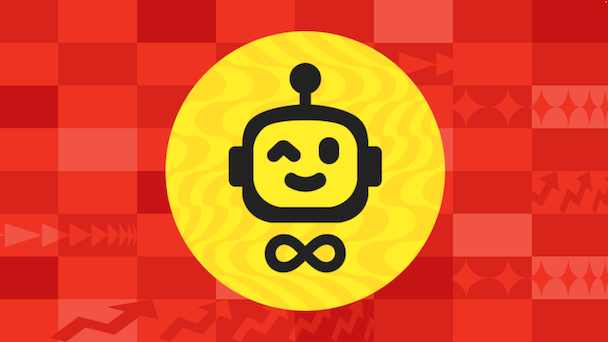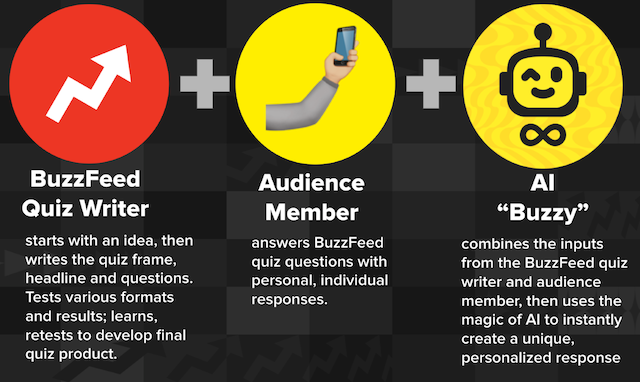How BuzzFeed is navigating AI-generated content with advertisers
As BuzzFeed leads the charge into AI-generated content, how is that altering its relationship with advertisers?

The logo and design for Buzzy by BuzzFeed
Last week BuzzFeed deployed the first iteration of its Infinity Quizzes – AI-generated quizzes that have a joint byline of a human author and ‘Buzzy’, its proprietary generative AI platform based on OpenAI. Of the first raft of quizzes, one was sponsored by Scotts Miracle-Gro, just as any other piece of content.
But with questions about the brand safety and accuracy of AI-generative articles across the industry more widely, how is BuzzFeed negotiating this early period of uncertainty – and how will that impact its advertiser relationships?
Buzzy and beyond
BuzzFeed’s AI-generated quizzes are created through a combination of three parties, only one of which is artificial. A BuzzFeed spokesperson explains that the AI only comes in at the tail end of the process, significantly reducing the potential for the mistakes in creation seen elsewhere:
“The quiz is fully created by a human; then they test all of that information in the form of a prompt, that is entered into the AI. Then they get a variety of results and tweak the initial quiz accordingly, testing the many variations of inputs the audience might enter in. So, to be clear, AI is solely impacting the quiz result. It is taking the combination of the quiz writer’s inputs and the audience’s inputs, and then mixing them into a unique and personalized result.”

The answers are effectively monitored both by OpenAI’s moderation tool, as well as a proprietary moderation tool within BuzzFeed itself. The team believes there is ample testing by in-house writers and editors, as well as a careful design and creation process, that reintroduces the human element to the quiz creation.
It is that amelioration of the risks with AI-generative articles that is at the heart of BuzzFeed’s initial pitch to advertisers, with its announcement of the tool stating it is ‘an innovative and safe way for advertisers to engage with AI-powered content’.
To that end, its partnership with Scotts Miracle-Gro is an ongoing partnership, with more custom content for that sponsored quiz coming in the near future. BuzzFeed explains says: “We’ve had a long history with Scotts, especially for partnering together on innovation. So when they heard what we were working on they got right in and we worked together to develop the right idea for both our audience and Scotts.”
The future deployment of the tool – and further experiments – is dependent upon user responses. They noted that the team will apply its typical BuzzFeed data analysis methods to identify trends, gauge user behavior – quiz retakes, sharing in group chats, social sharing – then identify what the team should explore next from that data. It is part editorial performance analysis and part ongoing product development.
AI-created value
Marketers are keen to explore the opportunities around AI-generated content, with the potential for greater personalization of articles and quizzes to complement targeted advertising. It is that ability to create the relevant context for ads and sponsorships, which has led advertisers to believe that AI-generated content should have price parity with human-created articles.
Tom Davenport is managing director at Digital Marketing Specialist and believes that AI-generated ads should not be priced differently. He explains: “If a brand is using AI to generate content, the advertiser isn't necessarily going to know about it. If advertisers really care – and I don’t think they do, provided they get a topic-relevant impression – then there might be independent research which starts scoring publications and domains for whether they’re using AI.”
The team at BuzzFeed acknowledges that it is still early days when it comes to deploying AI-generated content. While other publishers have fallen afoul of using tools like ChatGPT for creating articles from whole cloth, Buzzy’s role as one of the tripartite elements of Infinity Quizzes means that BuzzFeed should skirt those safety issues.
Given that BuzzFeed’s stock price increased dramatically following the announcement of its use of Infinity Quizzes and the propensity for marketers to jump aboard the latest hype train, it is likely that we will see more digital publishers rush into the space in the near future. For the moment, the safety net of human moderation is compensating for any potential brand safety issues.
